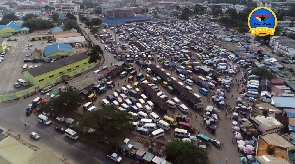Israel Nkegbe never imagined a time when he would feel afraid to leave his house. Once a strong and commanding chief police inspector, he now struggles just to breathe. The world outside his house is filled with dangers: toxic air pollutants that could trigger an attack that takes his life.
A year ago the 63-year-old was diagnosed with Chronic Obstructive Pulmonary Disease (COPD), a lung disease afflicting a growing number of Ghanaians. Around the world it takes three million lives each year. Nkegbe needs to use three inhalers, at least three times a day to survive.
“At the moment, I find it difficult to breathe and walk,” Nkegbe says one recent afternoon on the porch to his house. “When I walk a little distance, I find it difficult to breathe so I will have to stop on the way for a while before I continue. If I get some place, I can sit down for some two to three minutes, then I continue. As it is, I don’t walk again to go far distances. I only walk around my environment.”
It is fair to say that almost every Ghanaian within Accra has boarded a mini-bus, known as “trotro”, at some point. These buses are the most common means of transportation in the capital where 70 percent of commuters depend on them to get around each day. Yet, unknown to all of us, they are also a growing killer.
Forty percent of air pollutants in Accra come from transport, according to the Clean Air Fund, a UK charity driving improvements in air quality, making it the biggest single contributor to air pollution.
Health experts say these pollutants lead to serious health complications including COPD, asthma and even lung cancer. But it also exacerbates illnesses in other areas such as heart disease and diabetes. Poor air quality can also have devastating impacts on children impacting brain and body development.
Air pollution in Ghana has had little attention before now. It causes at least 28,000 deaths a year in Ghana according to the World Health Organisation and costs the country $US2.5 billion a year – equivalent to four percent of the economy.
Air quality is measured by the amount of fine particulate matter in the air. The most dangerous – known as PM 2.5 – measures particles that are smaller than a strand of human hair. They are so small they seep into the lungs and bloodstream of people who inhale them.
Watch the full documentary here:
Dr Samuel Asomani, Senior Registrar, Pulmonology at the Department of Medicine and Therapeutics of the Korle Bu Teaching Hospital, says these pollutants can then cause, or worsen, a range of illnesses.
“Apart from asthma, we have something called chronic obstructive pulmonary disease,” Dr Asomani says. “It’s also a form of airway disease that is either exacerbated and potentially also brought on by pollution because the pollution can be what is outside or what is in the immediate environment of the person.
Something like bronchitis and then certain pollutants, can also, in the long run, cause something like cancer.”
Accra is now Africa’s fastest growing city meaning this problem is only going to get worse. The Environmental Protect Agency and other stakeholders including the DVLA are working to head off a growing crisis. The EPA has worked with stakeholders on a plan and is now looking at how to get buy-in.
“If we really want to bring the levels down and the various stakeholders that need to come on board because when it comes to regulating air emissions, it is not only EPA, other stakeholders also come on board,” says Selina Amoah, Acting Director of the Environmental Protection Agency’s Environmental Quality Unit. “When we talk of vehicle emissions, DVLA comes in. Transport issues: Ministry of Transport.
Acting Director Amoah says a 2018 air quality management plan is being reviewed and a new plan devised to extend the plan to Greater Accra. This month stakeholders will be invited to make inputs and then implementation will begin.
In the short term the EPA has been monitoring air quality at 17 locations around the city and has developed a colour coding system, with alerts issued on X, the digital platform formerly known as Twitter, to alert residents to the dangers they face day to day.
Others are pushing more ambitious plans. Alex Johnson, Head of Transport at the Accra Metropolitan Assembly, has a plan to develop bike lanes and pedestrian spaces to encourage more people to work and cycle. In the short term, he has an easy solution: car-free days.
“I think they are the lowest hanging fruit we can get especially in trying to adjust our culture to making sure that the environment is clean,” Johnson says. “The way car-free days are implemented, they take cognisance of a lot of factors, to make sure that, it does not affect economic activity.
In other African cities that we know are implementing car-free days, they implement on a regular basis on Sundays, between 6 am and 12 pm, so it’s just half a day.
Analysing the kind of benefits they get even for just about six hours of opening up the environment for people instead of cars, it’s quite enormous.
It’s a pollution-reduction strategy. If we keep at it for a long time, you’ll have a multiplier effect as the years go by.”
The hope is that day by day life will become easier for those like Nkegbe who are already facing the harms of air pollution and over time fewer people will share his fate.
This story was a collaboration with New Narratives as part of the Clean Air Reporting Project. Funding was provided by the Clean Air Fund. The funder had no say in the story’s content.
Authored by Wonder Ami Hagan
General News of Tuesday, 17 October 2023
Source: www.ghanaweb.com













